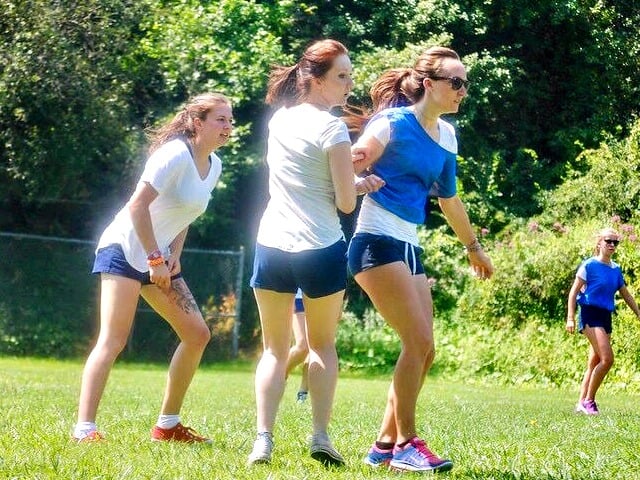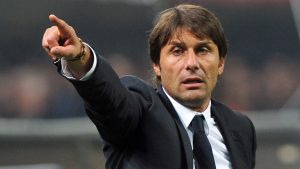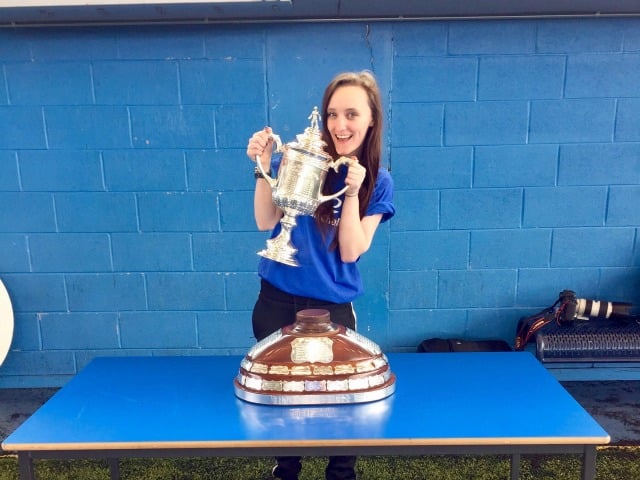As part of our ongoing project to garner the opinions of football coaches from all over the world, we spoke to one of the rising stars of youth soccer coaching in Scotland, Kirsty McFarlane.
In recent years, there has been a significant rise in the number of female coaches working within the game. In 2014, Helena Costa became the first female coach to take charge of a men’s professional team when she was appointed Head Coach of Clermont Foot 63 in France. Costa eventually quit her job as Clermont coach because she found out players were being hired without her consent. And just over a year ago, Chan Yuen-ting guided Eastern Sports Club to the Hong Kong Premier League title – the first time in football history that a men’s soccer team had been led to a professional top-flight championship by a female boss.
Such examples highlight the fact that that ambitious female coaches can now make it to the top level in the game. But there is no doubt that an already tough path can be even harder to navigate for women coaches thanks to lingering prejudice that exists within this male-dominated sport.
Thankfully, there are plenty of up-and-coming coaches working hard to prove that a good coach is a good coach regardless of gender. And of course, that can only be a good thing for the game in the long term.
Kirsty McFarlane is a perfect example of such a coach. And one who is willing to train and study hard to pursue her goals. In our recent chat, Kirsty offered some great insight into youth soccer coaching and shared her own unique perspective on the football industry.

Interview with Youth Soccer Coach Kirsty McFarlane
? Hi Kirsty, thanks for sparing the time for a chat. Firstly, can you tell us a little bit about yourself?
Hi, my name is Kirsty McFarlane, I am a 21-year-old sports student about to enter my honours year. I currently hold a BA in Sports Studies and a HND in Sports Coaching with Development of Sport.
I am also qualified at Level 1.1 – 1.3 in Youth/Adult Pathway, Level 1.1-1.3 in Children’s Pathway and Coaching Footballers with Disabilities.
Currently, I am working as Head Football Coach for Falkirk Community trust, Community Coach with Clyde FC Community School of Football and as a Performance Analyst for Rangers FC.
? What age range of players have you coached and at what level?
Throughout my years of studying, I have coached a variety of age groups from children as young as three to adults in their 30s. Currently, I work with children in the 3 – 12 age group, boys and girls around the age of 8 or 9 and young boys at the age of 14-15.
The boys and girls play in a Sunday league against other local teams and the older boys play in the Central Glasgow C League against teams across the central location.
? As a young coach starting out, it can be quite tough balancing life, work and study. What motivates and drives you each day?
I get motivated by seeing individuals do well. I like to give back and help others to succeed and this is probably the biggest motivator for me – to see participants I have worked with enjoying themselves and developing through my coaching. This motivates me to continue to be the best that I can and to give something back to them.
The main thing that has driven me to become a better coach is feedback – I enjoy getting both positive and negative feedback. Positive feedback is always good as it shows I am doing my job well and people are acknowledging me for my hard work, but I enjoy negative feedback too as it challenges me to tackle my problems and become better. I actually enjoy being challenged, so negative feedback is a good motivator for me to strive to be better.
? As a youngster, who influenced you to become the dedicated coach that you are today? And who inspires you now?
When I was younger, my biggest influence was my physical education teachers. I always had a keen interest in sport when I was younger and they helped to keep me interested and motivated me to go further in the world of sports. They also inspired me to become a physical education teacher, a path that I am now fulfilling.
These days, I get inspired by the children I coach. Seeing the children enjoying themselves and learning new skills – which makes them pleased with themselves – inspires me to continue doing what I do.
? How do you think female coaches are perceived within the youth soccer coaching industry today? And what barriers (if any) do you think still exist for such aspirants as yourself?
Although there has been a major growth in female coaches within the industry there will always be limitations just because the sport has always been perceived as a male sport. As such, there is a huge male dominance within the industry.
In my opinion, some people will always favor male coaches over female coaches because they think that men have a better knowledge of the game and will more suitable overall; when in fact, the female candidates might actually be the better coaches. I have personally experienced this type of barrier; however, you just need to pick yourself up and move on. And in my case, I ended up in a better role.

? On a personal level, what are your ultimate goals and ambitions within the game?
My ultimate goals within the game are to go as far as I can and be the best coach I can be to my participants. In the coming years, I would like to progress up the ladder and become a top level coach. Personally, I would like progress to a level where I can run my own class and have my own little football school.
? How would you describe your coaching style or philosophy?
I would say I have a mixed coaching style, I like to plan my own drills and sessions; however, I am open to hearing any suggestions my participants have. I am very informative with my participants, I always explain my drills and ensure everyone understands what is required of them before allowing the drill to run. Throughout my drills, I am always looking for opportunities to stop – when something has gone wrong or has not been great – to ask athletes how it could be improved and to see if they can identify why it maybe didn’t run well.
? And how would your young players describe you as a coach?
I think my players would describe me as a good coach with a good knowledge of the sport. I always try to bring new drills to my participants and they seem to react well and enjoy them. They would say I am a positive, bubbly coach who likes to bring new ideas and help players to develop.
? Is there a modern coach working at the top level today who reflects your own vision of the way the game should be played? Or one that particularly inspires you?
If I am honest, there are a few coaches who reflect my own vision. I think every coach has their best style of play and I think combining a couple of these makes the game a lot better.
I think playing out from the back and trying to play football through the field rather than the long ball up the park is the way the game should be played. Don’t get me wrong, I know that isn’t always an option and sometimes the ball needs to be lobbed up the park; however, I would prefer to play from back.
I have been very inspired by Antonio Conte’s vision of play, with which he led Chelsea to the Premier League title. He came in and switched things up which has worked in his favour. He has tried to exploit his player’s best positions in order to benefit the team and gain success.
Although a back-three isn’t always a great option in youth football, my team have tried it a few times late on in the game to push the play forward, and it has shown some success with a few late goals in our matches.

? This kind of tactical switch (moving to a back-three during a game) can be quite challenging for young players. At what age do you introduce both technical and tactical work into your youth soccer coaching sessions?
I try to incorporate technical and tactical work in my U9s team sessions; however, it is very challenging as not all children fully understand the game at that age.
? You mentioned earlier that you develop your own session plans, can you describe that process?
I try to create my own session plans combining a combination of different drills and skills. In my sessions, I use drills I have created myself and drills I have seen other coaches used that have inspired me. I try to use drills that flow and allow the session to run smoothly without a lot of chopping and changing. I will always leave time at the end of a session for a game where participants can put into practice what they learned in the drills.
? Can you describe a typical day at work?
A typical day at work for me consists of planning different drills to put into my sessions, organising what equipment will be needed for the drills, looking at adaptations for the drills should I have too little or too many participants. Once all that is in order it a matter of waiting until the session starts before putting the drills into action.
? A coach always evolves throughout their career, what are the most significant changes you have noticed in your own coaching style over time?
I think that by working with a variety of age groups through my studying and coaching career I have learned different youth soccer coaching styles and how to use the right coaching style when needed. I feel that now I understand the difference between coaching styles my own style has improved as a result. I know how to adapt my coaching to suit the particular group of participants I am working with.
Before I would just stick to the one style and it sometimes caused sessions to go badly and not run smoothly. Now, I feel my sessions now run more smoothly and I feel more confident as a coach.
? How do you deal with mistakes and what mistakes have you made that you would urge others to learn from?
Over my years of coaching, I have made many mistakes; however, I have taken them on board and learned from them. My biggest mistake was doubting myself. This caused me to make more mistakes because I was trying to do everything so perfectly when nothing is perfect. This knocked my confidence as I felt I couldn’t do anything right because I was always striving for perfection.
One day it dawned on me that not everything will run to plan and it is all part of the excitement of coaching. I realised I should just let things run. As long as the participants are enjoying themselves and benefiting from the sessions then I am doing something right.
Once I realised this it allowed me to be freer with my coaching, because I knew if something went wrong I would know how to deal with it and make it run more smoothly.
? Do you touch on subjects such as health, lifestyle and nutrition with young players? If so, at what age does this become part of your teaching?

I only see my teams twice a week – once for training and once for a game – so it is hard to find time to drill these kind of subjects into them. Therefore, I tend not to focus on these topics and instead focus on football skills. Although, if it is mentioned to me, I am always willing to discuss it with the children and give them the best advice I can.
I try to mention it to my U9s, explaining that to succeed in football you have to keep a healthy lifestyle and be active. I feel the younger you embed these ideas the more beneficial they will be in the long run.
It is harder with the U15s as many of them are stuck to junk food and feel they can eat what they like because they come to training to run it off.
? How do you view the coach’s relationship with parents and how do you manage difficult parents yourself?
It is important for coaches to have a good relationship with parents because without the parent’s help coaches may not have a team – given that the parents are the ones bringing their children.
Difficult parents are a part of any team but coaches just need to learn to deal with them. Parents will moan and get annoyed if their child isn’t getting picked or if they feel they are not getting the best attention.
Coaches need to explain their choices to the parents so they are always in the loop and understand what is happening with their child. It’s a case of trying to find the balance between keeping the parent happy and keeping the team running smoothly.
? And finally, what crucial piece of advice would you give to any aspiring young player today?
Never give up! Your time will come, you just have to keep your head up and work to be the best that you can be. Not every opportunity will be right for you but there will be opportunities which are. You have to strive to be the best you can and prove your doubters wrong.
You can follow Kirsty and check out her session plans on Twitter here: @kmc_coaching
You can also read more of Kirsty’s views on football at Kettle Magazine.
If you enjoyed our latest youth soccer coaching interview, and are interested in giving your child access to specialist soccer training, please check out our website or get in touch today on (+44) 203 769 94 43 or (+34) 902 750 359.

